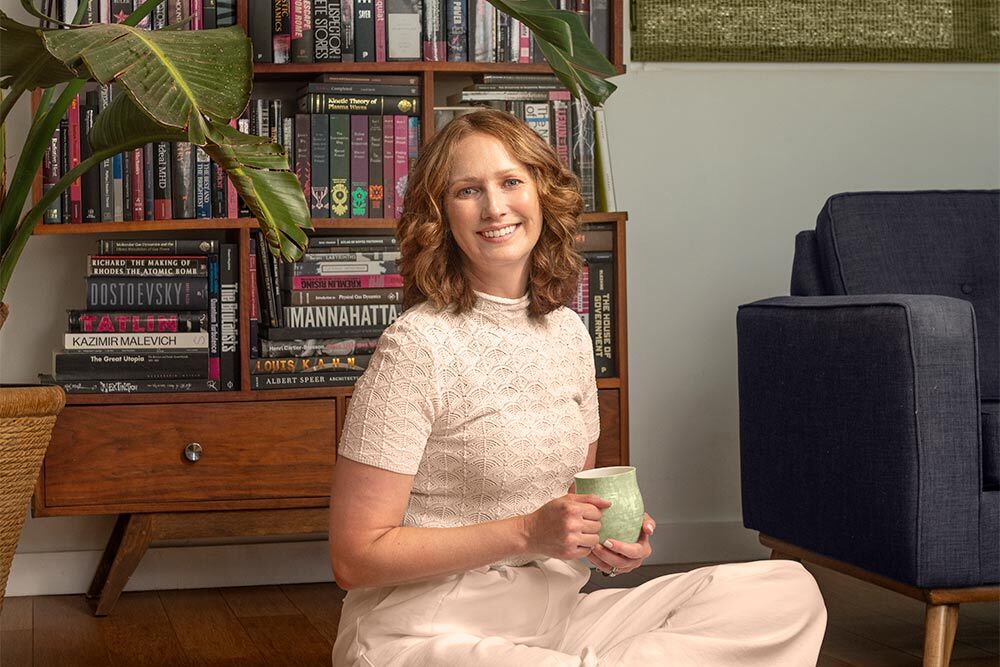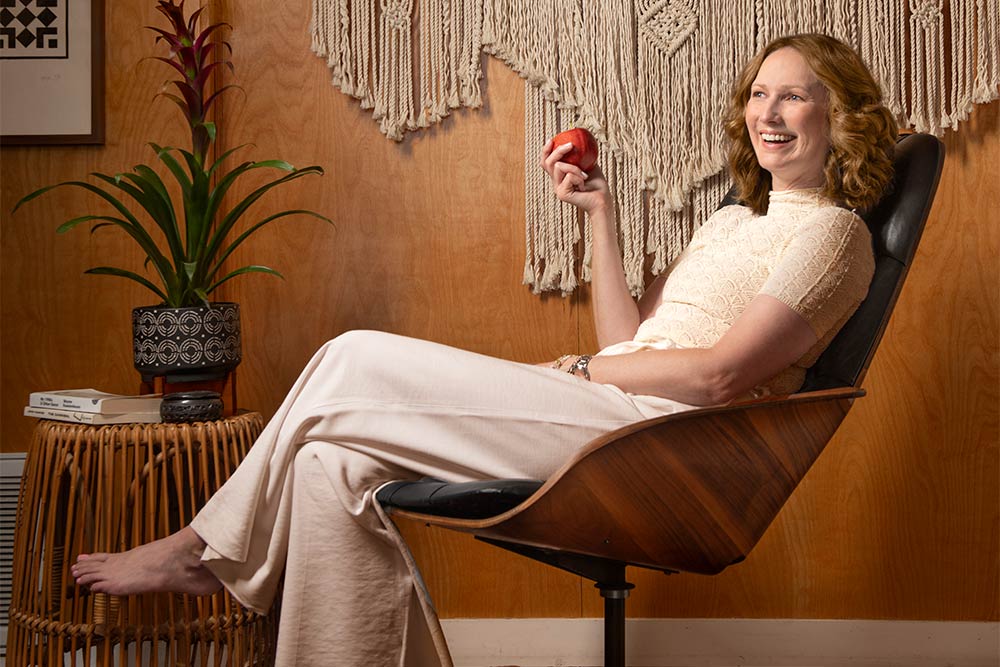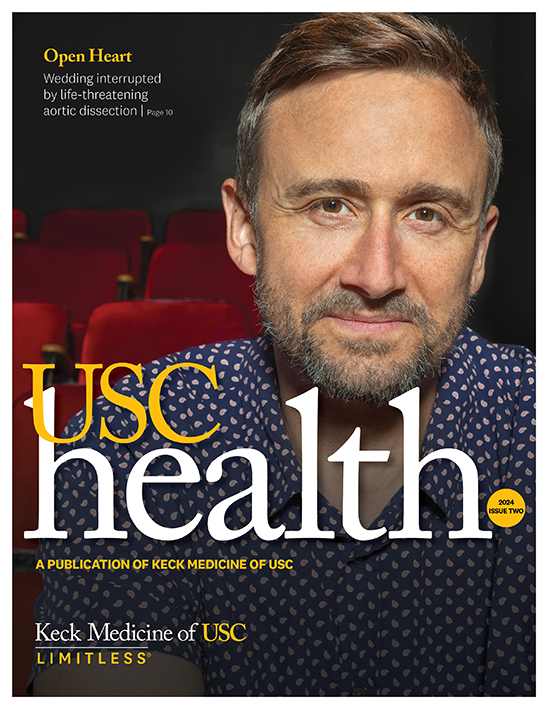
Diagnosed three days before her 38th birthday, Lauren Yerkes is now committed to informing and supporting others.
In December 2021, 37-year-old Seal Beach resident Lauren Yerkes found a lump in her breast.
The chief merchandising officer at a Southern California apparel company, Lauren went to her gynecologist, who ordered a mammogram. The test didn’t show anything concerning, she says, and her physician told her that because there was no family history of breast cancer and she wasn’t 40 yet, there was no reason to worry.
But a few months later, Lauren experienced another symptom, a nipple discharge. So, in early April 2022, she had an ultrasound and biopsy of the lump. This testing revealed an invasive, triple-negative breast cancer, a form of the disease that tends to quickly grow and spread.
She received the diagnosis three days before her 38th birthday.
“I was shocked,” Lauren says. “It was like someone had punched me in the stomach, because it came completely out of left field. I thought my life would soon be over.”
Breast cancer consultation
After Lauren consulted with an Orange County breast surgeon, family and friends highly recommended that she see Louis A. Vandermolen, MD, an oncologist with USC Norris Comprehensive Cancer Center, part of Keck Medicine of USC, which has a clinic location in Newport Beach.
“The biopsy showed that she had the most aggressive, life-threatening cancer, which needs urgent treatment,” says Dr. Vandermolen, who specializes in breast and lung cancer. “In general, 30% of women with breast cancer will have this triple-negative type. With aggressive treatment, the chance of long-term survival is 70%.”
He also recommended that she have genetic testing. It revealed that she carried the BRCA2 gene, which significantly increased her chances for both breast and ovarian cancer.
Lauren remembers the doctor speaking with her and her husband, Chris, for nearly 90 minutes during the consultation.
“He was very thorough, talking about what cancer means, the treatment plan and options, and recurrence and success rates,” she says. “He made me feel very comfortable and comforted.”

Pre-surgery treatment for breast cancer
Because of the threat posed by Lauren’s type of cancer, Dr. Vandermolen recommended that she undergo chemotherapy and immunotherapy before breast removal surgery.
Conveniently, she could get those infusion treatments just upstairs from his office at Keck Medicine’s Newport Beach facility, which Dr. Vandermolen describes as “cutting-edge, offering the best, proven therapies and new, investigational ones, with all the tools and staff required to treat these kinds of cancers.”
He explains that Lauren needed whole-body infusion treatment because her type of cancer carries a high risk of spread throughout the body, and “studies have shown a better outcome if you do the therapy preoperatively.”
I also want to give back to the breast cancer community, providing a glimmer of hope for newly diagnosed women under 40 that there is life after cancer.
Lauren Yerkes, patient, USC Norris Comprehensive Cancer Center
She began a scheduled 16 rounds of therapy, but it was cut to 14 at the end of September 2022 because of side effects she experienced to what Dr. Vandermolen describes as “an aggressive, toxic treatment.”
In early November 2022, Lauren had a double mastectomy, which Dr. Vandermolen recommends for women with the BRCA2 gene because there’s a high chance of the second breast becoming cancerous too.
“Analysis of the breast tissue that was removed showed no remaining cancer,” he says. “The pre-surgery treatment had done its job.”
Then, in March 2023, Lauren had reconstructive breast surgery, followed by a hysterectomy in December, because her genetic makeup put her at up to a 35% risk of ovarian cancer.
Now, Dr. Vandermolen’s prognosis for Lauren, whom he describes as “very nice, smart, capable and knowledgeable,” is very good. “Because Lauren has had a complete pathological remission, her chance of the cancer reoccurring is less than 10% throughout her whole body,” he says. “She is being monitored with follow-up blood tests, physical exams and periodic imaging.”
Changing priorities after breast cancer
In November 2024, Lauren will be two years cancer-free.
She says Dr. Vandermolen and other Keck Medicine staff have provided “amazing care that has been thoughtful and attentive.”
In addition, she says her breast cancer experience changed her priorities, prompting her to resign from her job.
“Before, I was focused on long work days and missed out on other things in life,” says Lauren, who loves baking chocolate chip cookies and taking three-to-four-mile walks most mornings.
“Now, I’m more focused on being with my husband and family. I also want to give back to the breast cancer community, providing a glimmer of hope for newly diagnosed women under 40 that there is life after cancer.”
Through social media and in-person meetings, she has been sharing her experience with and answering the questions of those women.
In Dr. Vandermolen’s view, such advocacy for other young breast cancer patients can be “extremely beneficial and helpful, especially when the advocate is someone who has already experienced cancer.”
He also says that because younger cancer patients tend to have more aggressive forms of the disease, “it’s important that young women tell their providers about any breast symptoms, and if diagnosed, they should seek care from a cancer team that will offer them cutting-edge and appropriately aggressive treatments.”
Interested in supporting the work of Keck Medicine? Visit this page.
Topics


